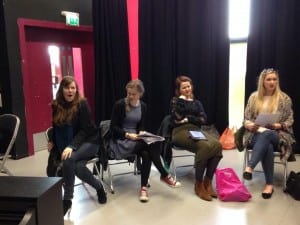Oddey states that when devising a piece of theatre it is necessary to have a clear plan as to how the company will operate from the outset. “This involves choices about how working structures relate to organised roles or responsibilities of individuals within a company…” (Oddey, 1994, 42). From our first ever company meeting I have taken on the role of producer, and, having never produced a show before, have been grappling with some of the roles and responsibilities that come with this job. Now, five days away from our first ever company performance I feel that I can reflect on what this role has become for me and how it has impacted the running of the company to date. It was apparent from quite early on that I was going to be more of a “do-it-all producer who is involved in every aspect of the show” (Seabright, 2010, 5), not just a solely administrative producer. I feel that the best way to describe my role in the company is to state that I have my fingers in all the pies. Richardson states that having “a flair for organization” is a very useful qualification for a producer to have (Richardson, 1998, 6), and indeed I have found that it is a skill that I have put to good use in the running of the company. I have been consulted by, involved in, and given the seal of approval for everything behind the scenes at Hand Me Down. I have proof read and edited press releases, pondered over poster designs and organised an acoustic night to raise awareness for our companies debut performance. I have kept tabs on the finance department who have had control over the budget for our performance and have therefore been essential in the running of the company and have held regular production meetings with our director and production manager to ensure that all performance elements are running smoothly and that our performance is logistically viable. I have also devised rehearsal time tables fitting around and keeping in mind the other work, personal and educational commitments of the eight other members of the company, kept tabs on the attendance of company members and booked appropriate space to suit the needs of each of these rehearsals.
Inspirational dramaturg and Theatre Workshop director, Joan Littlewood stated that
“It is through collaboration that this knockabout art of theatre survives and kicks” (Littlewood, 1965).
This is a quote that I strongly agree to be true. The collaborative nature of the way that Hand Me Down naturally works means that every member of the company has been involved in the creation of our performance, and with every member of the company being part of the cast for Take Me By The Tongue, it seemed appropriate that everyone should have some say in what it was they were to be performing. On reflecting on our process I feel that our piece clearly shows the “overall flexibility, versatility, and integration between the…multi-talented members” within our company (Oddey, 1994, 65). It has been fortunate for us that in most cases the cast have all agreed on the content and aesthetic of the scenes that we have devised. However, on the rare occasion that there is a disagreement on the content or nature of a scene, having listened to everyone’s opinion it has fallen to myself and our director to make the ultimate decision.
Initial Devising Process. Image by Kirsty Jakins (2014)
Of course getting feedback from members of other companies and staff has been absolutely invaluable for our company’s performance development, as we are aware that it can be hard to remove yourself from the scene and criticize it from an outsiders perspective. In order to meet our mission statement’s point of creating theatre that “is relatable for a variety of audiences” (Hand Me Down, 2014) we have had to monitor the audience demographics that we think might be more receptive to certain scenes. However, a scene that we believe might be appreciated more by one audience demographic might in fact be more appropriate for another. This is where our work in progress showings have been particularly important.
Works Cited
Hand Me Down. (2014) Our Mission Statement. Lincoln: Word Press. Available from https://handmedownth3atr3.blogs.lincoln.ac.uk/our-mission-statement/ [Accessed 26/05/2014].
Littlewood, J. (1965) Goodbye Note From Joan. In: Marowitz, C., Milne, T. and Hale, O. (eds) The Encore Reader. London: Methuen.
Oddey, A. (1994) Devising Theatre: A Practical and Theoretical Handbook. London: Routledge.
Richardson, J. (1998) Careers in the Theatrer. 6th Edition. London: Kogan Page.
Seabright, J. (2010) So You Want To Be A Producer? London: Nick Hern Books.

